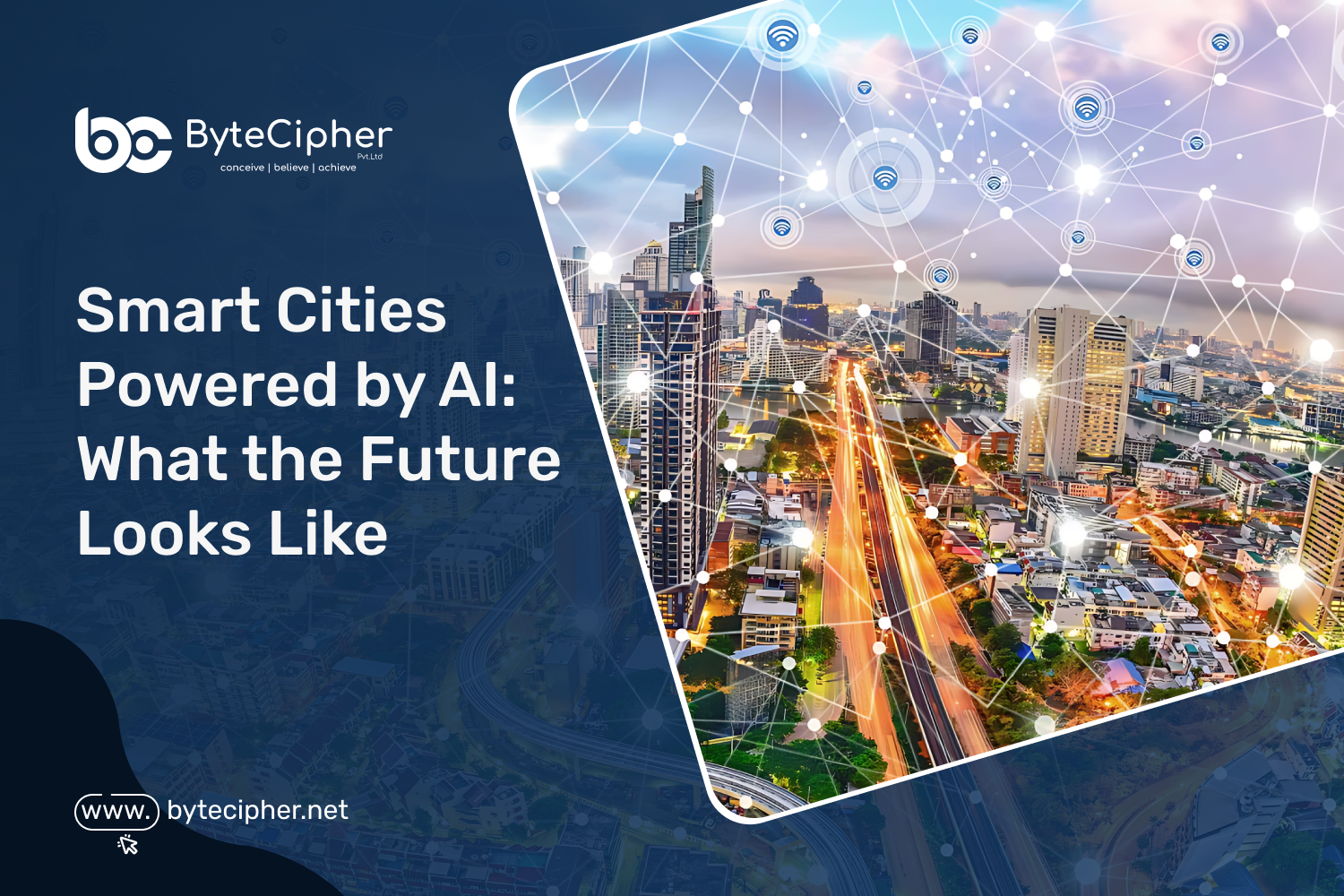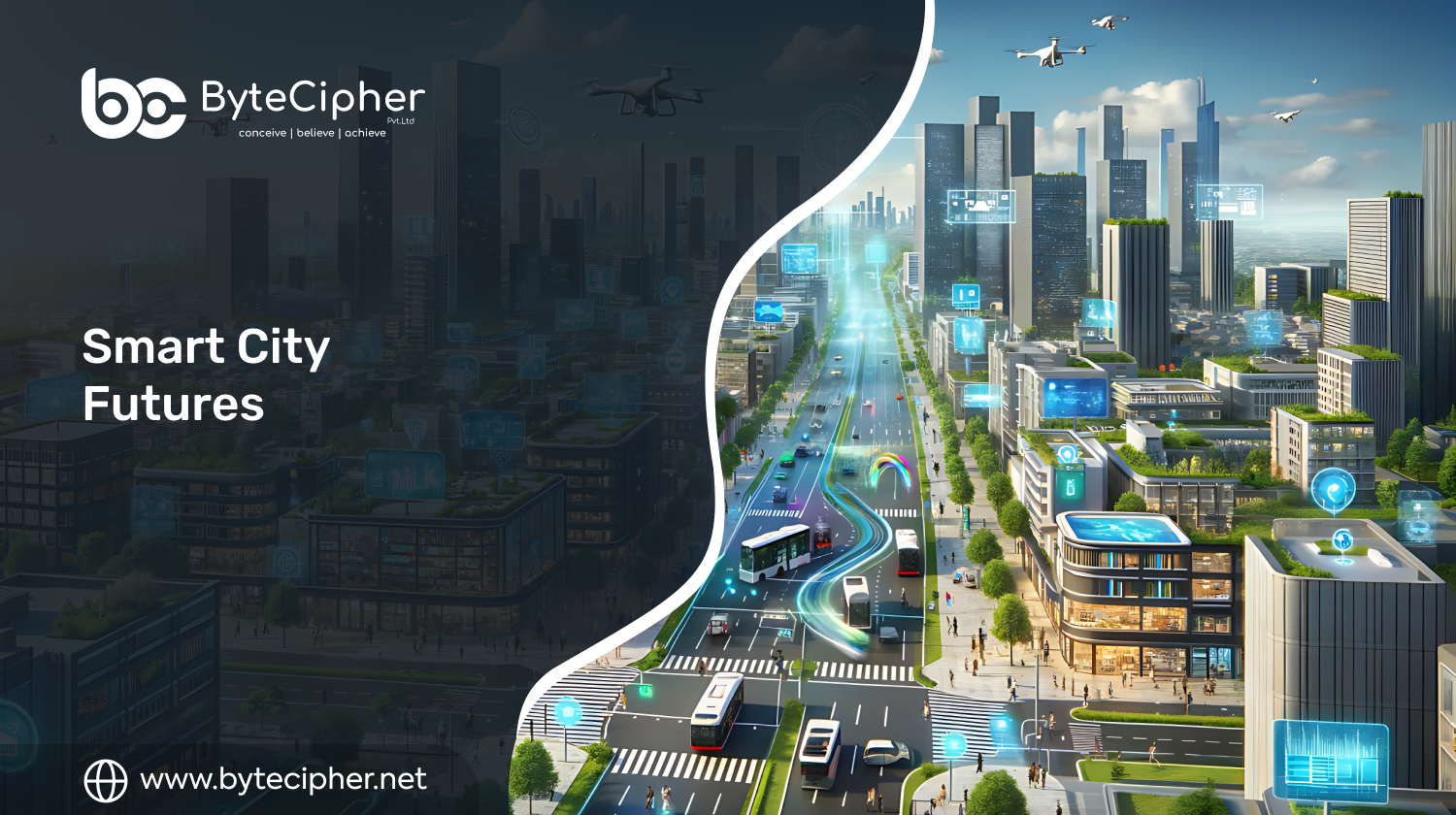
Cities all throughout the world are going through a digital transformation as a result of the rapid advancement of technology. Artificial Intelligence (AI) is significantly influencing the cities of the future, from intelligent waste management systems to traffic lights that adjust to patterns of congestion. These AI-powered smart cities are the ideal fusion of creativity and pragmatism, with the goal of improving urban life’s efficiency, sustainability, and citizen-friendliness.
This article examines how AI is transforming the urban experience, enhancing infrastructure, maximizing energy efficiency, and creating communities that are safer and more interconnected.
AI-Powered Smart Cities’ Ascent
Although the idea of “smart cities” is not wholly novel, the scale and intelligence that they may currently attain are unparalleled. Intelligent automation, IoT devices, and data integration are now more effective than ever before because of AI.
Millions of sensors, cameras, GPS units, and other linked devices gather real-time data, which is the foundation of smart cities. AI uses this information to make cities act and think like living things. Urban management becomes more proactive and sustainable as a result of systems’ ability to anticipate, adjust, and learn from human behavior.
Singapore’s “Smart Nation” effort, for instance, employs AI to monitor the environment, optimize traffic flow, and even save energy in public housing. Similar to this, Dubai’s AI-enabled “Smart Dubai” vision centers on using digital platforms driven by cognitive analytics to deliver government services.
More Intelligent Infrastructure Using Predictive Intelligence
AI makes it possible for cities to maintain and manage their infrastructure remarkably well. Reactive in nature, traditional maintenance methods frequently wait for a breakdown to happen before acting. AI-powered predictive maintenance, on the other hand, reverses this strategy.
Through constant observation of sensors installed in buildings, bridges, and roadways, artificial intelligence (AI) can predict when repair is necessary, minimizing downtime and saving millions of dollars in public expenditures.
To find microcracks or early indicators of fatigue, for example, AI algorithms might examine vibration or stress data from bridge sensors. This promotes safety and sustainability by assisting authorities in taking preventive action before calamities strike.
In addition to upkeep, AI is assisting planners and architects in simulating whole city models. In order to ensure efficient resource allocation and a minimal environmental impact, planners can digitally evaluate various layouts, building materials, and designs using these simulations.
The Future of Urban Mobility and AI
One of the main issues that contemporary cities face is urban mobility. Ineffective transportation systems, pollution, and traffic jams can all seriously impair productivity. AI offers intelligent transportation solutions as a means of progress.
1. Astute Traffic Control
To comprehend traffic in real time, AI-driven traffic systems examine real-time feeds from cameras, GPS, and sensors. They prioritize ambulances and fire engines, automatically change traffic lights, and recommend different routes based on this data.
Cities like Amsterdam and Los Angeles are already testing machine learning-powered adaptive traffic management systems that can cut gridlock by as much as 20%.
2. Driverless and Networked Automobiles
AI is crucial to the perception, navigation, and decision-making processes of self-driving cars. Cities will see a transition to more sustainable, less crowded, and safer modes of transportation as these technologies advance.
3. Optimizing Public Transportation
Predicting passenger demand, optimizing bus and metro routes, and guaranteeing on-time arrivals are all possible using AI algorithms. Wait times, energy use, and operating expenses are all decreased as a result.
Sustainable Development and Energy Efficiency
Any smart city strategy must prioritize sustainability, and artificial intelligence is the brains behind it.
AI-powered energy management systems are able to dynamically balance supply and demand by analyzing real-time data from public infrastructure, businesses, and households.
For example:
- AI helps smart grids integrate renewable energy by forecasting patterns in energy use and maximizing distribution.
- In order to provide methods for minimizing energy waste, smart meters examine user behavior.
- AI controls temperature, ventilation, and lighting in smart buildings according to occupancy and meteorological circumstances.
In smart buildings, AI regulates lighting, ventilation, and temperature based on occupancy and weather conditions.
Improving Emergency Response and Public Safety
AI is changing the way cities handle emergencies. Computer vision and facial recognition technology enable sophisticated surveillance systems to identify suspicious activity instantly.
In order to forecast hotspots and improve police patrol routes, AI technologies also examine crime data. AI-driven command centers use real-time data from drones, satellites, and social media feeds to organize rescue efforts during calamities like floods or fires.
AI assists emergency responders in Tokyo by evaluating weather and seismic data, generating early warnings that have prevented many fatalities.
Management of Waste and Water: Intelligent, Sustainable, and Clean
Thousands of tons of rubbish are produced daily in cities, and effective waste management is essential. Artificial intelligence (AI) aids in the development of intelligent waste management systems by anticipating bin fill levels, streamlining collection routes, and even automatically separating recyclables.
AI helps with leak detection, consumption forecasting, and water quality assurance in water management. Data intelligence may immediately increase sustainability, as demonstrated by the over 20% reduction in water loss in places like London due to AI-based leak detection.
Using AI to Engage Citizens and Promote Smart Governance
A city that is truly smart empowers its residents. Artificial intelligence (AI)-powered e-governance platforms enable citizens to voice issues, access services online, and even take part in decision-making.
Virtual assistants and chatbots that use Natural Language Processing (NLP) make it easier to access public services, such as scheduling communal facilities or paying energy bills.
AI analytics also assist governments in implementing citizen-driven policies, monitoring public opinion, and evaluating comments. This increases openness and strengthens public institutions’ credibility.
Challenges – Juggling Creativity and Accountability
Although artificial intelligence has great promise, it also presents new difficulties. Cybersecurity and data privacy are two important issues. Smart cities depend on constant data flow, but it’s critical to make sure that this data is shared, kept, and utilized responsibly.
Adoption may also be slowed by lack of compatibility among city systems, bias in AI algorithms, and the expensive implementation costs. To develop frameworks that guarantee the ethical, equitable, and secure use of AI, governments and tech companies must cooperate together.
Smart City Futures
Smart cities driven by AI are a huge step toward a more sustainable and interconnected world. Artificial intelligence (AI) has the power to change the way we live, travel, and communicate, from predictive infrastructure to environmentally friendly energy systems and citizen-first governance.
Cities will transform into intelligent ecosystems that are resilient, self-learning, and adaptive in the upcoming years as AI advances and becomes more widely available. The city of the future will not only be intelligent, but also human-centered, striking a balance between sustainability, empathy, and creativity.

About ByteCipher Pvt. Ltd.
ByteCipher Pvt. Ltd. is committed to creating intelligent digital solutions that empower communities and enterprises alike. Our goal is to use technology to make a significant difference, using scalable web and mobile applications and AI-driven software solutions.
Whether in the fields of fintech, edtech, enterprise automation, or urban innovation, we assist startups and major corporations in turning their concepts into smart, data-driven solutions.
For more information on how we’re using technology to influence the future, visit www.bytecipher.net.


